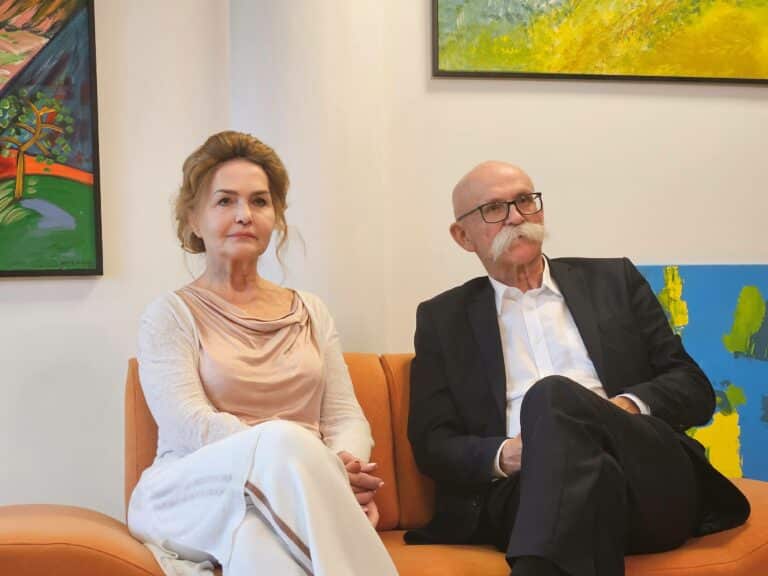Concerning fake news
Fake news mainly from Russia has become a key concern in Europe, with CEE on the front line. Poland Weekly spoke with Mateusz Zadroga, from FakeNews.pl.
“We could see an increase in disinformation narratives during the women’s strike against stricter abortion laws in the fall of 2020. Many manipulated and falsified narratives were created around this topic, as well as the broad issue of women’s reproductive rights. These were generated primarily by far-right activists and journalists,” Mateusz Zadroga, from the “Counteracting Disinformation” Foundation, FakeNews.pl, said.
Zadroga adds that at least since 2016, the Main Directorate of the General Staff of the Armed Forces of the Russian Federation (GRU) has been conducting Operation Ghostwriter. Its aim is to: “Disrupt Poland’s relations with the US and NATO countries; Disrupt Polish-Ukrainian relations; Discredit the aid provided by Poland to Ukraine; Create conditions for the outbreak of social unrest in Poland,” according to the official website of the Polish Cyberspace Defense Forces Command.
Passing off as Poland’s Ministry of Internal Affairs and Administration, in January 2023, Russian intelligence services forged the ministry’s official logo and sent thousands of emails to Polish citizens asking them to provide information on whether they wre hosting or renting rooms to any Ukrainians. In May, Russian hackers compromised the website of a military hospital in Lublin. Using the fake website, they ran an article suggesting that the corpses of members of a (real) Belarusian volunteer regiment fighting on the side of the Ukrainian army had been quietly brought to the Polish hospital. In March, GRU officers posing as the Polish police sent out a message to several thousand citizens (fake sender addresses included: P0licja.eu, Police-pl.info and P0licja.info). Recipients were told to expect bomb attacks, and not to approach any bags or suitcases left unattended, not to open anonymous packages, and above all, to inform the law enforcement in case they witness any type of suspicious behavior.
“It was a calculated effort intended to cause panic,” Maksym Sijer, an expert on Russian disinformation tactics associated with the INFO OPS Poland foundation, told wyborcza.pl. The foundation’s profile of activity is focused on “analyzing the manipulation processes aimed at the Polish-speaking information environment,” says Kamil Basaj, an associate at the Polish Ministry of Defense.
Russian propaganda accuses Ukraine of being a neo-Nazi state, committing genocide against Russian speakers, developing nuclear and biological weapons and being influenced by Satanism. It also accuses NATO of controlling Ukraine and building up military infrastructure in Ukraine to threaten Russia. It portrays Ukrainians as “Little Russians” or “part of an all-Russian nation.”
Predicting that after the first wave of aid, resentment towards Ukrainian visitors might grow among Poles, Russian propaganda began to develop the following false narrative lines:
- Refugees from Ukraine will change the demography of Poland and Poles will be second-class citizens;
- Border guards will not control border crossings and criminals will come to Poland;
- Ukrainian refugees will start persecuting Poles;
- Ukrainian refugees will bring crime and diseases to Poland;
- Ukrainian refugees will seize social help intended for Polish families and children;
- Ukrainian refugees will be too much of a burden on the state budget
Switch from anti-vax to pro-Russia
“It quickly became apparent that many former anti-vaccine accounts had retrained themselves as pro-Russian propaganda, targeting refugees,” says Zadroga. Disinformation analysts working in the InfoTester project recognized a new trend in communities promoting false content – a shift away from the topic of the pandemic and COVID-19 vaccinations towards the war in Ukraine and the situation of refugees in Poland. IBMS reports indicated that up to 90% of anti-vaccination accounts made the narrative shift at the beginning of the war in Ukraine.
Satanism and the dark arts
In May 2022, Russian state media claimed that Ukraine was using black magic to fend off the Russian military. RIA Novosti said that evidence of black magic had been found in an eastern Ukrainian village; according to their report. Vladimir Solovyov, a presenter on state-owned channel Russia-1, also called the invasion a “holy war” against “Satanists” and said Russia is up against fifty countries “united by Satanism.” Assistant secretary of Russia’s Security Council Aleksey Pavlov called for the “de-Satanization” of Ukraine in October 2022, claiming that the country had turned into a “totalitarian hypersect.”
On October 8, 2023, a video supposedly of Hamas thanking Ukraine for supplying them was shared by an X account linked to the Wagner Group. It was viewed over 300,000 times and shared by American far-right accounts. The next day, former Russian president Dmitry Medvedev tweeted, “Well, Nato buddies, you’ve really got it, haven’t you? The weapons handed to the Nazi regime in Ukraine are now being actively used against Israel.”
Disinformation related to the import of Ukrainian grain has died down, but it continues to echo in the Polish information space, taking the form of attacks on the Ukrainian government, which is said to be showing gross ingratitude by protesting against Poland’s grain import ban, Zadroga says. “This attitude is intended to prove that supporting Ukraine will never be met with true gratitude,” he says.
In Ukraine, Zadroga adds, the emphasis is on alleged corruption and incompetence of the government and military command, which allegedly has neither the skills nor the ability to conduct an effective counteroffensive.
Zadroga notes there are plenty of civilian trolls. Most of them work under the aegis of the Russian Federal News Agency (FAN), which owns more than a dozen large Russian and foreign-language sites such as Gazeta.ru, Sputnikglobe.com, Topwar.ru, Life.ru, Pravda.ru, Oroszhirek.hu, DEnews-front.info. Combined, they have a total website traffic of over 30 million page views each day.
Then there is also an entire army of paid internet users. Their most famous group is officially known as the Internet Research Agency (AII), but is widely referred to as web brigades or the “trolls of Olgino” (a district of St. Petersburg). Internet users, influencers, and provocateurs paid by the state create fake news and comment on it on social media.
“Pro-Russian trolls aren’t just concerned with convincing people to believe these particular narratives,” explains Martyna Bildziukiewicz, the Brussels-based head of the East StratCom Task Force (ESTC), the EU’s team for combating Russian disinformation. “Their goal is much more dangerous: to create chaos and confusion so that no one knows where the truth ultimately lies. They want anyone seeking information to get confused and give up participating in the debate altogether.”
Two examples from the Russia Today TV website: “In Denmark, places have been created for zoophiles who want to have intercourse with a turtle.” The “brothels for zoophiles” in Denmark – this “news” was spread in Poland by, among others, the Wsedno24.pl and Nczas.com web portals. The latter is an online branch of “Najwyższy Czas!,” a weekly owned by the former MEP Janusz Korwin-Mikke. It read: “A brothel for zoophiles will open in Copenhagen. This is the first such case on the Old Continent. Danish law allows human-animal relations. According to Denmark’s Minister of Food, Agriculture and Fishery Vlad Jorgensen, intercourse with animals is a constitutional right of every citizen.”
“The rotten, immoral, perverted West is a constant vector of influence for Moscow’s agents of chaos. Its roots go all the way back to Czarist Russia,” Sijer said. “The term ‘rotten’ was invented before 1917. One motive for this influence is to show the West through the prism of pathological behavior: negative emotions, demoralization, riots, crime. This is then juxtaposed with a carefully crafted image of Russia – a stable refuge of traditional values, where law and order persists and there’s no racial unrest.
Web brigades mostly consist of “educated people from smaller towns who moved to Moscow or St. Petersburg in search of a job, and who are well aware of what they participate in,” writes the head of the International Security Department at the Pedagogical University in Kraków, Prof. Olga Wasiuta, in the Geopolitical Review.
Migrant misinformation
When the first wave of refugees from Ukraine arrived in Poland, it included citizens of third countries such as India, Pakistan, Ghana and Nigeria. Most of them were foreign students at Ukrainian universities, whom Russian propaganda immediately accused of being economic migrants trying to take advantage of the situation to get to Poland. Dozens of fake accounts circulated fabricated information about a wave of robberies and rapes by “dark-skinned immigrants.”
According to Interfax, in 2021 Ukraine hosted more than 76,000 foreign students. It is therefore not surprising that they appeared among the refugees. The flood of fake news resulted in the formation of self-proclaimed far-right militias composed mainly of football hooligans, who attacked refugees. Such “patrols” were supported by politicians of the Confederation. Among others Grzegorz Braun, and Konrad Berkowicz called for stopping “the wave of dark-skinned migrants.”
Russian disinformation clearly also attempted to promote anti-refugee sentiment in Poland and other countries with an influx of mostly Ukrainian refugees. Social media accounts with ties to Russia promoted stories of refugees committing crimes or being unfairly privileged, or about locals discriminating against refugees (in particular, against black and non-Ukrainian refugees). Such disinformation was quite obviously intended to weaken international support for Ukraine.







